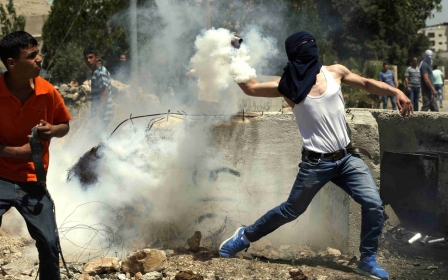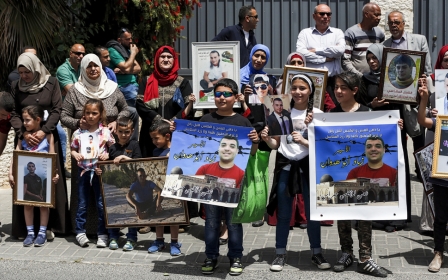Israel says 300 inmates end hunger strike; Palestinian official says it's not so

An Israeli minister said on Sunday that 300 Palestinians agreed to end an almost two-week-old hunger strike begun in protest of the conditions of their detention.
Qudwa Faris, head of the prisoners unit in Palestine, however, denied the Israeli claim, telling MEE in a telephone interview that all 1,500 Palestinian prisoners were continuing with the hunger strike.
Israel's internal security minister, Gilad Erdan, earlier said over army radio that 300 hunger strikers had "agreed to take food without having obtained" their demands. He added that 920 Palestinian prisoners remained on the hunger strike.
Erdan also said the prison service planned to set up 400 medical centres inside jails "to avoid as much as possible the transfer of hunger striking detainees to civilian hospitals".
The hunger strike began on 17 April, with those taking part ingesting only water and salt. They have issued demands ranging from better medical care to phone access.
Palestinian ambassador to Egypt Gamal al-Shobky spoke of the hunger strikers in a Sunday news conference: “Israel is putting them in conditions that lead to their slow death.”
Shobky condemned the Israeli stance on Palestinian detainees that remains unchanged despite intervention from the international community, the Red Cross, and Israeli civil society organisations, according the Egypt Daily News.
Shobky told the newspaper that Palestinian President Mahmoud Abbas discussed the issue with President Abdel Fattah al-Sisi, asking for Egypt’s solidarity, and said he will also discuss the issue during his scheduled visit to Washington in early May.
According to a statement from the Palestinian president, Abbas briefed Sisi on the condition of the detainees and said both heads of states agreed “there should be efforts to force Israel to respect international humanitarian law”.
Almost 100,000 Palestinians have been detained since September 2000, including women and children, according to a statement issued by the embassy.
Human Rights Watch’s report for 2016 said that Israeli forces have detained Palestinian children without the presence of adults or lawyers, and practise detention without trials, known in Israel as administrative detention.
Middle East Eye propose une couverture et une analyse indépendantes et incomparables du Moyen-Orient, de l’Afrique du Nord et d’autres régions du monde. Pour en savoir plus sur la reprise de ce contenu et les frais qui s’appliquent, veuillez remplir ce formulaire [en anglais]. Pour en savoir plus sur MEE, cliquez ici [en anglais].




